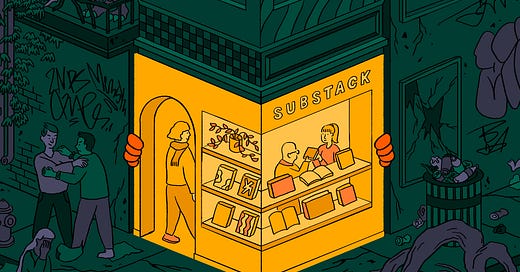The internet revolutionized reading, but instead of a utopia, it has delivered a mess. The main places where we read online today are cacophonic, stressful, and milking our minds for ad dollars. There are great reading products, but they are niche, and the tech giants seem to have lost interest in making them since the demise of Google Reader. Instead, we are left to contend with a fusillade of pop-ups and a Big Social-dominated media economy that is making us angry and stupid.
But the internet still holds tremendous promise for readers. It remains true that it democratizes access to news, information, and culture, so that anyone, anywhere can enjoy work that in previous generations was reserved for the privileged. Its powerful networking tools can still produce amazing communal reading experiences, and its viral dynamics can take memes to the moon. The trick is to weave these elements together with an economic system that incentivizes quality over superficial engagement, and trusted connections over tribal tantrums. No one has quite mastered that art.
Perhaps it is naive, but we at Substack haven’t given up hope. We think it is still possible to harness the internet’s powers to create a better world for readers. We can see a future where reading online is a pleasure, with fast-to-load posts, clean and uncluttered pages, and simple navigation. We believe in a business model that gives readers the power to help shape culture by directly supporting the writers and work they most value, leading to an incentive system that rewards quality and applies upward pressure for excellence in even the smallest of niches. We think that reading can be social without being distracting. And we bet that trusted peer recommendations can drive a discovery system that helps the world’s best readers find the world’s best work—no matter where it comes from.
So here’s what we’re going to do: We are going to make a beautiful and exceptional place for readers that extends the platform we’ve built for writers and uses the best of technology to get the best for culture.
Over the coming months and years, we’ll be adding features and evolving our reading apps so that they feel increasingly useful and fun. You’ll not only have a quiet place to read but also somewhere to hang out with the smartest people you know. It’ll be a space where you can establish a home for your cultural interests and build an audience even if you don’t have a publication. And it will all be tied together in a network of meaningful connections—represented by subscriptions—that prioritize trust over time spent or eyeballs captured.
It will be the best reading experience on the internet.
It has been clear for a while now who a Substack writer is. Writers have a direct and obvious relationship with the platform, the place where they publish, grow, and get paid. But until recently, few people would have described themselves as a Substack reader. Over time, we think this dynamic will change. Even while the writer-reader relationship will remain sacrosanct here, it will become ever clearer that there is such a thing as a Substack reader.
A Substack reader is someone who might be on the verge of opting out of online media because of their aversion to the toxicity of their social feeds. It’s someone who wants high-quality news and culture. It’s someone who’s willing to consider a range of sources, even ones that challenge their assumptions. It’s someone who wants to find a way to be online with dignity.
In creating a home for these readers, we can also better serve writers. Substack will be a gathering place for people who have a propensity to pay the writers they trust—and that’s a group that writers new and established can address when it comes to building their own audiences and influence.
Readers might be the internet’s most important constituency, and yet they have been treated like paupers. The companies that dominate today’s cultural sphere seem to consider the reader’s mind only insofar as it can be tricked into ceding its bounty of attention—the black gold of the “Information Revolution.” What a disappointing revolution it has been. We thought we were going to live in the Library of Alexandria; instead we’re wading through its sewers hoping to find wisdom on wet pages pasted to the walls.
The cultural challenges that we face as readers affect how we think and act together, and our response to them will determine how we confront the many problems we face as a society. When the author
launched Story Club on Substack, he wrote: “[H]ow we tell and receive stories is central to how we think, which, in turn, determines how well (how lovingly, how fully) we live.”What we read matters.
The work we are doing at Substack is our attempt to contribute to a better media ecosystem and a better world for readers. We will take the best of how the internet brings writers and readers together and couple it with an economic system that lets everyone win. We hope this approach can be the beginning of something new for the media. It is core to our mission of building a new economic engine for culture.
We’re grateful to be doing it with you. We can’t imagine anything more meaningful or fun. Let’s turn the page.







“Let’s turn the page”
Substack truly is the best of media at the moment. It genuinely feels like a community and a space to grow and thrive. I consider myself both a writer and reader Thank you for creating such wonderful opportunities for us.
Thank you for adding audio to our posts automatically. Now folks can listen while driving. 👏👂